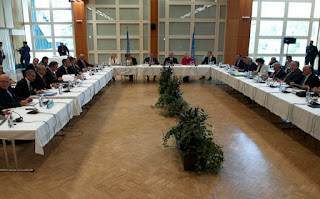Redrawing the Social Contract
The ongoing “yellow vests” protests in France are indicative
that something is amiss, in particular in the most developed and richest part
of the world. At a time when human development indicators worldwide are increasingly
positive with less people living in poverty, life expectancy growing, and more
getting an education, while those belonging to middle class outnumber those
living in poverty for the first time in history, the growing malaise in the
developed world is a cause for concern.
If we were to add that the options for Alejandro and his
generation, the so called ‘millennials’ is that even when they find employment,
their wages are too low, thereby increasing their chances to live on the verge
of poverty. With limited opportunities in the early stages of their careers,
the frustration of millennials with politics, politicians, and public
institutions grows. This in turn has a potential impact on their radicalization
and their turn towards populism together with other vulnerable population
groups such as the working poor, and the NEETS (Not in Education, Employment or
Training).
In other words, their feeling of being marginalized or disempowered
creates a volatile social mix that needs to be debated, understood, and tackled
both within countries as well as EU-wide. In this electoral year for Europe,
where European Parliament elections are to be held in late May, this growing
sense of deepening inequality is bound to be reflected in the composition of
the new European Parliament with possible dilatory effects on the functioning
of European institutions.
The need for a more inclusive economy comes to the fore. Is the
current growth model sustainable when, on the one hand, statistics show that
employment rates in the EU are at a record level according to the European
Commission with over 329 million people active parts of the workforce while, on
the other hand, much of it is insecure work at low wages and fewer working
hours than in 2008 when the economic crisis took hold? How does work or how can
it add value to society? This is another crucial aspect of today’s general
malaise that needs to be redefined. The emphasis of high growth rates coupled
with the effects of hyper-globalization is under question as its seems to
enhance pessimism with the political process and inequality in the workplace or
due to lack of access to it. In fact, across the democratic space that is
Europe, the diversity and democracy mantra beyond borders is increasingly
challenged by the rise of xenophobia as a response to the inability of states
to effectively address local development challenges that address job security
and proper wages. Part of the response of part of the political system is that
the influx of immigrants and asylum seekers from Europe’s poorer neighbourhoods
is responsible for the lack of opportunities across the continent for Europe’s
youth, the working poor, and the NEETs.
Effectively, something has to change. The Social Contract is
in dire need of reassessment and rewriting otherwise the triptych of democracy,
economic growth, and globalization cannot sustain itself for much longer. And
if what happens in the developed world is the bellwether for the state of the
rest of the globe, whatever advances in the standards of living and the human development
indicators may eventually stall or regress.
It may be time to for Europe to seriously reconsider what it
stands for. It needs to aspire to and promote a more resilient, inclusive, and compassionate
society and economic model in order to ensure the viability and growth of the
democratic space and its diversity that embody it. Otherwise, the Social Contract
will find itself unable to be reformulated without further and potentially
destabilizing polarization, dissension, and division that would lower the
quality of the normative aspects of integration and a more equitable economic environment
to the detriment of the millennials and other disadvantaged groups with real grievances
and concerns. Advancing the causes of dignity (economic and social) and freedom
(human rights, rule of law, and democracy) is a must.





Comments